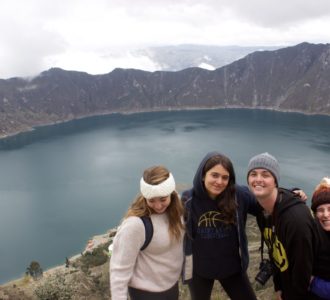Again, again, and again us fellows were warned of the evil that would come about if we had these certain things embedded in our minds. These things that could ultimately cause a harder time while in community by setting us up for possible success but most likely tearing us down by the shock of everything we were experiencing. Depending how you look at them, these things could be the epitome of the danger of a single story*. These ‘things’ I’m talking about just happen to be something you were maybe expecting: expectations. It took me a while to realize, but I had just those.
My first full day here I walked up upon a brand new washing machine next to my room. A few days later, a small, but comfortable couch showed up in our living area. My family owns 2 cars and right now they are adding a bathroom to the house. My nephew (whom I live with) came home with 20 plus presents from his baptism celebration. Every meal is accompanied with a novela (soap opera) on our small, but flat screen, TV. Currently I am writing this blog on my computer which is able to connect to our high speed wifi. Did I mention my room is here is bigger than mine in the states and the whole kitchen has just been redone? To say the least, I wasn’t expecting to have the resources here that have been given to me.
However, there is a whole other side to things as well; I’m not saying my life here, or others’ (family members, neighbors, etc) in that case, is easy. For example, my house isn’t insanely nice: my bedroom floors are concrete covered in odd vinyl, there are cracks everywhere I look, and it’s just a simple building made out of concrete in which they decided not to cover with paint. With its unfinished doors and walls, most of it basically looks like it’s always under construction. Moving on, If I want drinkable water, I have to boil it. Also, one of my students/friend, David, lives right across from me and his house is made of about 2 concrete rooms (kitchen and living quarters) with a contraption of a tarp and umbrella used as the roof. There’s about 6 or 7 people in his family. Thoughts of empathy and confusion lie in my head as I’m living directly across from him with a big room to myself, many blankets, and other resources he most likely doesn’t have access too. However, I don’t really ever have snacks and if I do, it’s what I have for breakfast everyday- sugary coffee and a piece of bread. The closest market, where we get our fruits for juices and veggies for soups, is a 30 minute drive away. Similarly, my nearest hub city is an hour and a half (sometimes 2 hour) bus ride. Basically, resources I had in the states that were maybe a 5 minute drive away are now unusually far for me and I have to plan my entire week around it. In addition, everyday I struggle with communication. I have learned that being ‘fluent’ in another language takes on multiple definitions and the effort one needs to put in to improve in a new language is excessive. I am also being challenged within my world of community involvement. Constant thoughts of ‘am I really putting as much effort as I can?’ or ‘am I becoming successful in the role that I wanted to play here?’ In the end, these are just some of the struggles I have faced that continue to push me out of my comfort zone.
But I’m here to tell you that one of my biggest struggles, whether it is a little hard to admit it or not, was, and sometimes still is, simply accepting the fact that I have been living with a somewhat very privileged family here in Ecuador. Bringing the topic of expectations back, let me just say that that was not what I was anticipating at all. Coming here made me realize that I was expecting, or maybe even hoping, to be living a more simple life without these resources. A life without wifi, running water, etc; I was hoping to be ‘roughing it’ as they say.
However, no challenge is fought without a lesson learned. In this case, I’ve learned two. Firstly, that maybe these expectations made me stronger. By drilling me down then inevitably forcing me to accept that I had given into a single side of a story, I have learned the importance of what it really means to have an ‘open mind.’ I thought I would be placed in a home which clearly suggested a harder life through certain things. Now, I’ve learned that there are many lifestyles here suggest that in different forms. Secondly, I have been taught that my time here is valid. Even if my lifestyle here is less of a ‘roughing it’ situation, my emotions are valid, struggles are valid, lessons learned are valid, and my Global Citizen Year is valid. I am having to consciously take the steps to be pushed out of my comfort zone instead of simply being placed there. And this is okay. This is just different than expected.
* ‘The “Danger of a Single Story”, a 2009 TED Talk by Chimamanda Adichie, a young Nigerian author, provides a powerful tool for the Facing History classroom. In the twenty minute video, Adichie describes the powerful impression the multitude of British stories made on her as a young girl growing up in Nigeria. She argues that inherent in the power of stories, is a danger—the danger of only knowing one story about a group. “The single story creates stereotypes, and the problem with stereotypes is not that they are untrue, but that they are incomplete. They make one story become the only story.”’ –http://lanetwork.facinghistory.org/the-danger-of-a-single-story-2/


